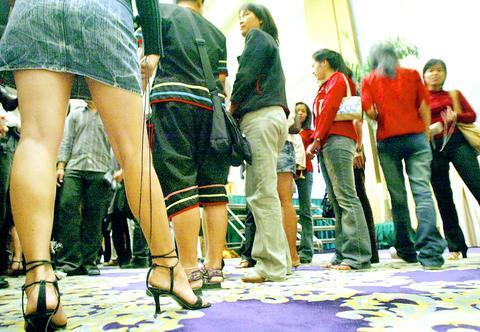Thai academics, officials and sex workers gathered yesterday for a national debate on a proposal to legalize prostitution, a multi-billion-dollar industry dogged by exploitation and police corruption.
The government says legalization would give the estimated 200,000 sex workers access to social services, health care and protection from abuse while exposing corruption among the industry's gatekeepers -- police, politicians and business owners.

PHOTO: AFP
"Every Thai person is entitled to basic human rights under the Constitution," said Justice Minister Pongthep Thepkanchana, who hosted the seminar attended by some 200 people.
"The government will not make a decision hastily. So it's going to take a long, long time, but we can't tell when," he said.
But in a recent interview, the minister said it is clear the government will have to "tackle this problem one way or another."
Prostitution was made illegal in 1928, and the laws against it strengthened in 1960. But it is an omnipresent part of the Thai society, tacitly accepted and tolerated.
Prostitution goes on in brothels in the countryside, behind the garish signs over Bangkok's girlie bars and massage parlors.
The industry is estimated to account for an estimated 3 percent of Thailand's economy, or about US$4.3 billion a year.
But because prostitution is illegal, brothel owners pays no taxes, instead giving regular bribes and hush money to corrupt policemen. Meanwhile, sex workers are treated like slaves with little or no rights.
"We just want to take care of ourselves," said Noi, a 26-year-old who has worked as a prostitute for two years and asked to be identified only by her nickname. "But we need insurance, we need everything."
She said if prostitution becomes legal "we won't have to hide from the police" and would have recourse against customers who are violent or refuse to pay for services.

With much pomp and circumstance, Cairo is today to inaugurate the long-awaited Grand Egyptian Museum (GEM), widely presented as the crowning jewel on authorities’ efforts to overhaul the country’s vital tourism industry. With a panoramic view of the Giza pyramids plateau, the museum houses thousands of artifacts spanning more than 5,000 years of Egyptian antiquity at a whopping cost of more than US$1 billion. More than two decades in the making, the ultra-modern museum anticipates 5 million visitors annually, with never-before-seen relics on display. In the run-up to the grand opening, Egyptian media and official statements have hailed the “historic moment,” describing the

SECRETIVE SECT: Tetsuya Yamagami was said to have held a grudge against the Unification Church for bankrupting his family after his mother donated about ¥100m The gunman accused of killing former Japanese prime minister Shinzo Abe yesterday pleaded guilty, three years after the assassination in broad daylight shocked the world. The slaying forced a reckoning in a nation with little experience of gun violence, and ignited scrutiny of alleged ties between prominent conservative lawmakers and a secretive sect, the Unification Church. “Everything is true,” Tetsuya Yamagami said at a court in the western city of Nara, admitting to murdering the nation’s longest-serving leader in July 2022. The 45-year-old was led into the room by four security officials. When the judge asked him to state his name, Yamagami, who

DEADLY PREDATORS: In New South Wales, smart drumlines — anchored buoys with baited hooks — send an alert when a shark bites, allowing the sharks to be tagged High above Sydney’s beaches, drones seek one of the world’s deadliest predators, scanning for the flick of a tail, the swish of a fin or a shadow slipping through the swell. Australia’s oceans are teeming with sharks, with great whites topping the list of species that might fatally chomp a human. Undeterred, Australians flock to the sea in huge numbers — with a survey last year showing that nearly two-thirds of the population made a total of 650 million coastal visits in a single year. Many beach lovers accept the risks. When a shark killed surfer Mercury Psillakis off a northern Sydney beach last

‘CHILD PORNOGRAPHY’: The doll on Shein’s Web site measure about 80cm in height, and it was holding a teddy bear in a photo published by a daily newspaper France’s anti-fraud unit on Saturday said it had reported Asian e-commerce giant Shein (希音) for selling what it described as “sex dolls with a childlike appearance.” The French Directorate General for Competition, Consumer Affairs and Fraud Control (DGCCRF) said in a statement that the “description and categorization” of the items on Shein’s Web site “make it difficult to doubt the child pornography nature of the content.” Shortly after the statement, Shein announced that the dolls in question had been withdrawn from its platform and that it had launched an internal inquiry. On its Web site, Le Parisien daily published a